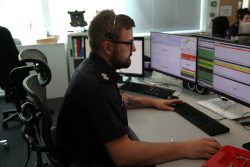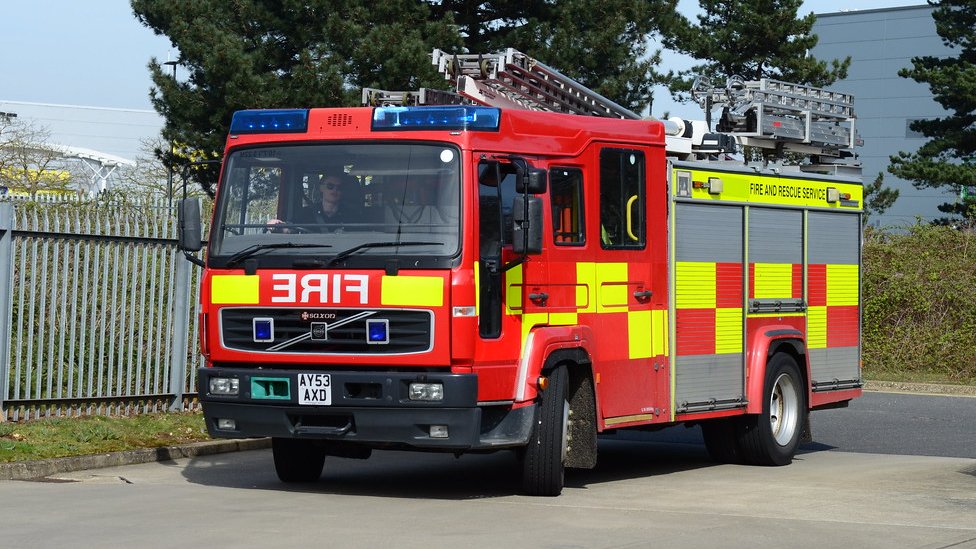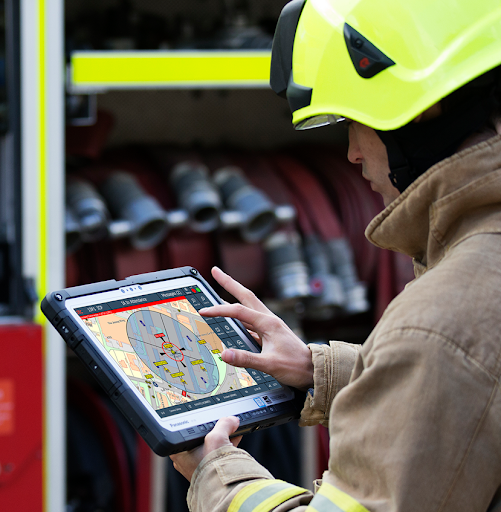Our control room customers are at the heart of everything we do; we work with them closely to ensure that our call handling and dispatch tools continue meeting their needs and making their lives easier. We rely on their collaboration, expertise and partnership every day – and this International Control Room Week 2025, we’re delighted to turn the spotlight on two members of the Bedfordshire Fire and Rescue Service (FRS) control room who exemplify the dedication, teamwork and expertise that helps keep a community safe.
Michael Ludlow, Firefighter (Control)
I’ve been with Bedfordshire FRS for just over three years. Being in the fire service has been my dream since I was around six years old – I don’t like heights so I couldn’t be a firefighter, but I love computers so being an operator worked out well. I first seriously considered working in a fire control room when I saw the Buckinghamshire FRS website URL on a fire appliance, and decided to look it up. The recruitment process is really challenging; it took me 15 applications and over ten years to actually get the role. The first time I entered the control room, I was so excited because I realised I had finally got my dream job, but I was also nervous. Luckily, it’s a very supportive environment – we’re a small control room, so everyone listens in and provides feedback on your calls while you’re learning.
The variety of the job makes it challenging, as you never know what you’ll be dealing with next. You might be dealing with a faulty fire alarm, or someone who’s been in a car accident. We’re always conscious that we might have someone’s life in our hands, and we take that responsibility seriously. The majority of the public probably thinks we just pick up the phone, but that’s only one small element of the job: for example, we also give callers survival guidance while the crew are on their way, and we coordinate with other agencies such as the ambulance service.
Fundamentally, I love knowing I’m giving something back to my community. My advice to anyone who’s considering a role in any FRS is to just apply, and keep trying if you don’t get in right away!
Mark Smith-Hobbs, Watch Commander
As of February 2026, I will have been at Bedfordshire FRS for ten years (I joined in a leap year, so technically I’ve only been here for two…). I was originally a control room operator, then a crew commander, and now I’m a watch commander. I fell into this career completely by accident: I was between jobs on a charity bike ride with my brother, who was a firefighter at the time, and he suggested I apply for an open position in the control room. I remember being so excited during my training period, then sitting down at my workstation for the first time and feeling absolutely terrified! And now, I’ve trained so many people on how to answer those calls that it’s second nature.

Mark on shift at Bedfordshire FRS.
As a watch commander, I’m responsible for both my watch and the day-to-day running of the control room, such as monitoring every call that comes into the control room. I still like to take 999 calls myself, but I don’t get to take them as often as I used to. I’m also responsible for making the decisions when our team responds to an incident, such as which firefighters and equipment we send to a fireground. Once the crew are on scene, I have to consider their welfare and ensure they have time to rest. In addition to managing ongoing deployments, I also plan ahead for future incidents; it’s like playing chess, always thinking six steps ahead.
Our firefighter control team is multi-disciplinary, which means everyone can do everything: you can take a 999 call, you can take an admin call, you can take a radio message, you can command an incident. We’re the first point of contact, and the last people to touch the incident when it gets closed. The scope of our work is massive; we handle road traffic collisions, rope rescue, animal rescue, water rescue, rural firefighting and high-rise firefighting… Even from a hazmat point of view, we’re a national asset as a service because we do mass decontamination. We’re not as busy as police or ambulance control rooms, but when we do get calls, they’re often in a flurry. If there’s a car fire on the M1 motorway, you’ll get 60 calls about it, and those 60 calls will come in over the course of just 10 minutes.
The best part of the job is the people. I’ve worked on every watch and they end up being like a family to you, because you spend big life events with these people – I’ve spent so many birthdays, Christmases and Easters in the control room.
For more information about our control room solutions, please visit motorolasolutions.com/guardian.




